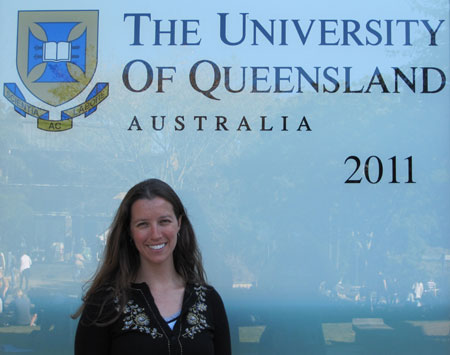Perspectives on Fish and Climate Change
Add Summary

Blogger: Abigail Lynch, a doctoral candidate in the Department of Fisheries and Wildlife and a CSIS member, blogs from Down Under -- she's in Australia to build a framework for her dissertation research. She's interested in developing a decision-support tool to regulate harvest management strategies for lake whitefish in a changing climate.
Perspectives on Fish and Climate Change
Wednesday, June 15, 2011
Today, I met with Anthony Richardson for what I am sure was the first of many mind crunching meetings for me in my quest to figure out how I will design my research framework. Anthony’s research focus and specialty is modeling marine ecosystems from plankton ecology up to fish population dynamics. Recently, he’s also added climate change to his repertoire. I came out of the meeting with a lot to think about and a lot to research.
for me in my quest to figure out how I will design my research framework. Anthony’s research focus and specialty is modeling marine ecosystems from plankton ecology up to fish population dynamics. Recently, he’s also added climate change to his repertoire. I came out of the meeting with a lot to think about and a lot to research.
- First, I need a solid grasp on the life history of lake whitefish to interpret which climatic, trophic, and general environmental variables may impact the population dynamics.
- Second, I need a solid understanding of what data is available to me and how I can use it.
- Third, I need to determine which modeling approach will best suit my research objectives.
Anthony suggested that the four most likely choices for my project will be ecosystem models, population models (ideally spatially explicit), species distribution models, or stock recruitment models. Lucy Robinson, one of his students and someone I hope to soon meet, recently published a helpful review on marine species distribution models .
Thursday, June 16, 2011
After four days without my luggage, it made a welcome appearance today! It’s kind of funny though, now that I’ve been living in such Spartan :D conditions for the past few days, as I unpacked, the amount I brought seems superfluous…almost…I have to admit, I was particularly excited to have my electric toothbrush!
Today was also my first venture into the city -- I attended a lecture at Griffith University on the South Bank of the Brisbane River. Not surprisingly, I got lost twice on the way, but miraculously made it with enough time to catch the great view of the skyscrapers across the river in the sun before the lecture began. Joseph Reser, of Griffith University, presented “Public risk perceptions, understandings, and responses to climate change.” Based on a parallel UK and Australia survey, he argued that the “social representation” of climate change is both societial (i.e., media) and individual and that the perception of risk affects understanding and consequently drives response. His study’s findings indicate that exposure to a threat changes one’s perception. So with increased local risk, there are strong implications for adaptation potential, precaution, and preparation. It’s interesting for me to compare it with what I know of the U.S. (principally learned in Tom Dietz’s course, Climate Change and Society). The U.S. public may be more polarized (Reser say that only 5.8% of Aussies qualify as true “skepti



 Print
Print Email
Email





